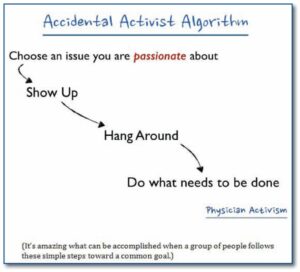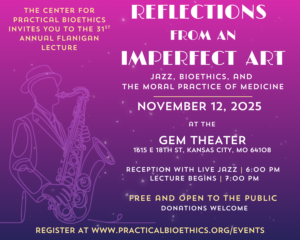Accidental Activist Gets Stuff Done – The 2025 Vision to Action Award Winner Edwin Kraemer MD
By Trudi Galblum - Marketing, Communications, and Grant Writing

Ed Kraemer’s formula for a life of meaning has four parts: Pick your passion. Show up. Hang around. Do what needs to be done. He calls it the “Accidental Activist Algorithm.”
It’s a formula that helps to explain why the Center for Practical Bioethics (CPB) will honor Ed with the 2025 Vision to Action Award at the Flanigan Lecture, on November 12. Growing up in Omaha, Nebraska, Ed was always focused on goals, graduating in 1987 from the University of Nebraska School of Medicine, followed by residency in Community and Family Medicine at the University of Missouri-Kansas City (UMKC).
In fall of 2005, Ed’s friend, former Vision to Action Award recipient and current CPB Board Chair Steve Salanski, MD, invited Ed to join him in meeting with a group of citizens to address health concerns about secondhand smoke in Lee’s Summit, Missouri.
Ed cared a lot about the issue but was wary of becoming involved in a high-profile, potentially controversial initiative. Long story short. He went to a meeting and with Steve ended up as co-chair of the group. When the City Council failed to pass the group’s proposed ordinance, Ed and Steve spearheaded a citizen’s petition, which passed, leading to the Clean Indoor Air Act of 2006, requiring all public places in Lee’s Summit to be smoke free.
Since then, Ed’s public health activism has included participation in the Lee’s Summit Wellness Commission, Kansas City Healthy Lifestyles Collaborative, Jackson County Community Health Projects, the Livable Streets Advisory Board, and more.
All of a Piece
For Ed, medicine, teaching, ethics and public health activism are all of a piece, each element relevant to the others.
While a pre-med biology major at the University of Nebraska-Omaha, Ed recalls his request for the university to provide a speaker on ethics in medicine getting turned down because the students couldn’t pay for it.
As a resident at UMKC and later as clinical faculty for a family practice residency program at another area hospital, Ed realized how much he enjoyed teaching. In 2011, after 18 years with Lee’s Summit Family Care group practice, he joined University Health (formerly Truman Medical Center) as an assistant professor of clinical medicine.
Soon afterwards at University Health-Lakewood, Ed mentioned that he was interested in the hospital’s Ethics Committee.
“This became a pattern,” he said jokingly. “I say I’m interested in something. Someone suggests that I come to a meeting. I come to the meeting and the next thing I know I’m the chair.”
From 2012 to 2023 as chair of the Lakewood Ethics Subcommittee and since then as vice chair, Ed’s been “doing what needs to be done.” He continues as a member of the UH-Truman Ethics Committee as well. He enjoys working with and learning from fellow committee members, especially his mentors Dr. Rick Butin and Dr. Brian Carter.
“When I join a group that has a good mission, I like to make it even better,” he said. “At Lakewood, I wanted to make the committee more inter-disciplinary. Get people involved from all over the hospital. Make it richer with diversity of opinions and informed decision making.”
The Overarching Question
Ed has participated in Center for Practical Bioethics’ Ethics Committee Consortium meetings and workshops.
“I’ve learned a great deal from talented people at the Center,” he said, citing past leaders such as Rosemary Flanigan, Robert Potter, George Flanagan, Bill Colby, Terry Rosell and, more recently, Ryan Pferdehirt. “Ryan has been extremely helpful in his faithful participation in UH Ethics Committee meetings and consults.”
Ed’s appreciation of bioethics grew alongside his involvement with the Center and the UH-Lakewood Ethics Committee.
“It’s gratifying to be part of the ethics committee process, he said. “To help people who may never know how you helped. It’s just a good thing to do. Also, you come to better understand that things aren’t always cut and dried. That health professionals anywhere can experience moral distress – feelings that maybe things aren’t right and maybe someone should speak up.”
As an ethics committee chair, Ed said that he learned to ask one question: Have all the people affected by this case or this issue been in the same room at the same time to discuss this? If the answer was no, he would suggest that they all get together and he would offer to join the conversation. If necessary, he would present the situation to the full ethics committee for their input.
“Almost always,” he said, “the overarching question is what would the patient want and how can we hear that patient’s voice?”
Path to Retirement
For the past several years, Ed has been on an intentional path to retire when he turns 70 next summer. He even published an article about it, Prepare Well to Retire Well, in the April-June 2024 issue of Missouri Family Physician.
For now, he continues doing what he enjoys most.
Since 2015 until recently, Ed served as the unofficial Director of Medical Ethics Education for Family Medicine residents, a docent of Year 1 and 2 medical students, and a faculty supervisor at the Sojourner Student-Run Free Clinic. He continues at UMKC School of Medicine as Assistant Professor of Clinical Medicine and as Medical Director of the MMS-PA (Master of Medical Science—Physician Assistant) Program, which includes teaching “Medical Ethics and the Law.”
Ed and his wife, Mary Duryea, a yoga instructor and retired family physician, have three adult children, Karl, Kelsey and Tessa, one grandchild, Leo, and another on the way.
In reflecting on being honored with the Center’s Vision to Action Award, Ed has this to say: “I’d like to acknowledge anyone who has been thoughtful and caring enough to ask the question – shouldn’t we ask the Ethics Committee about this?”


